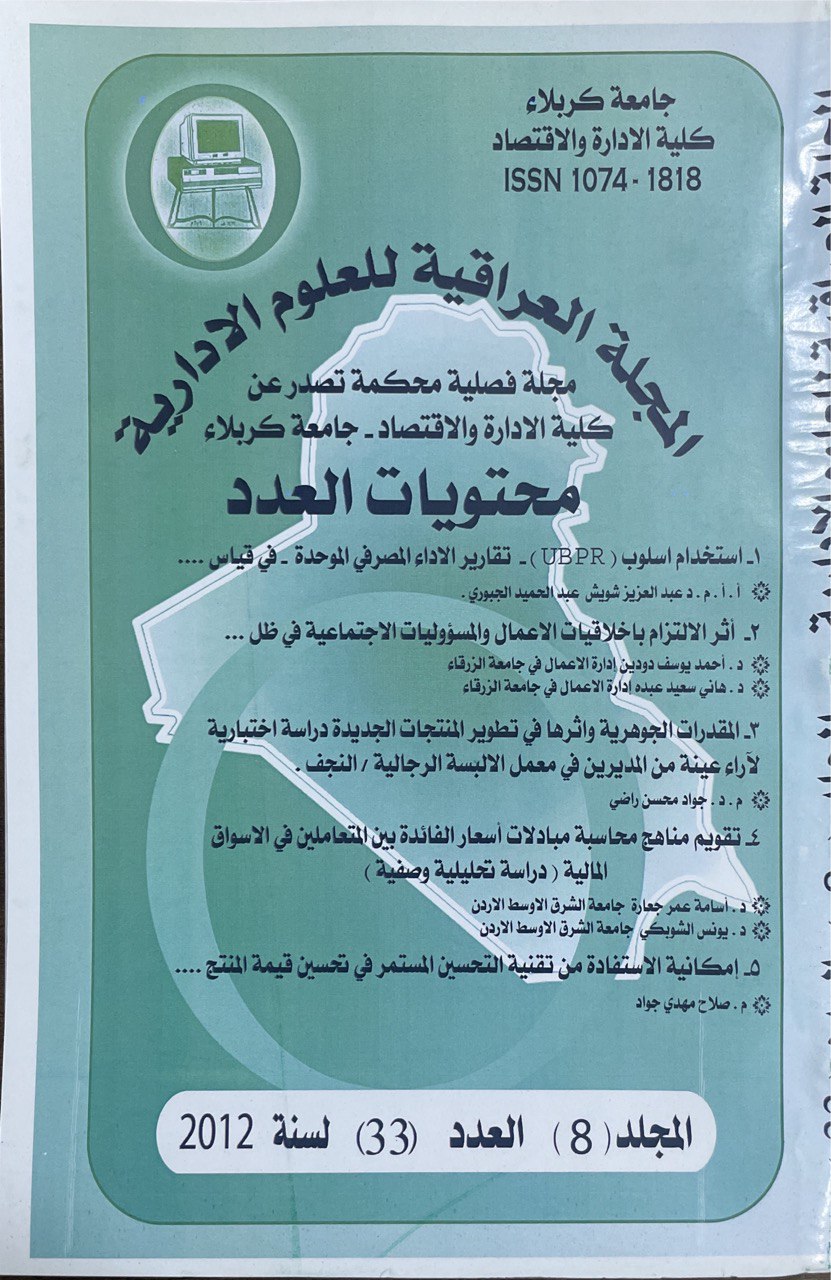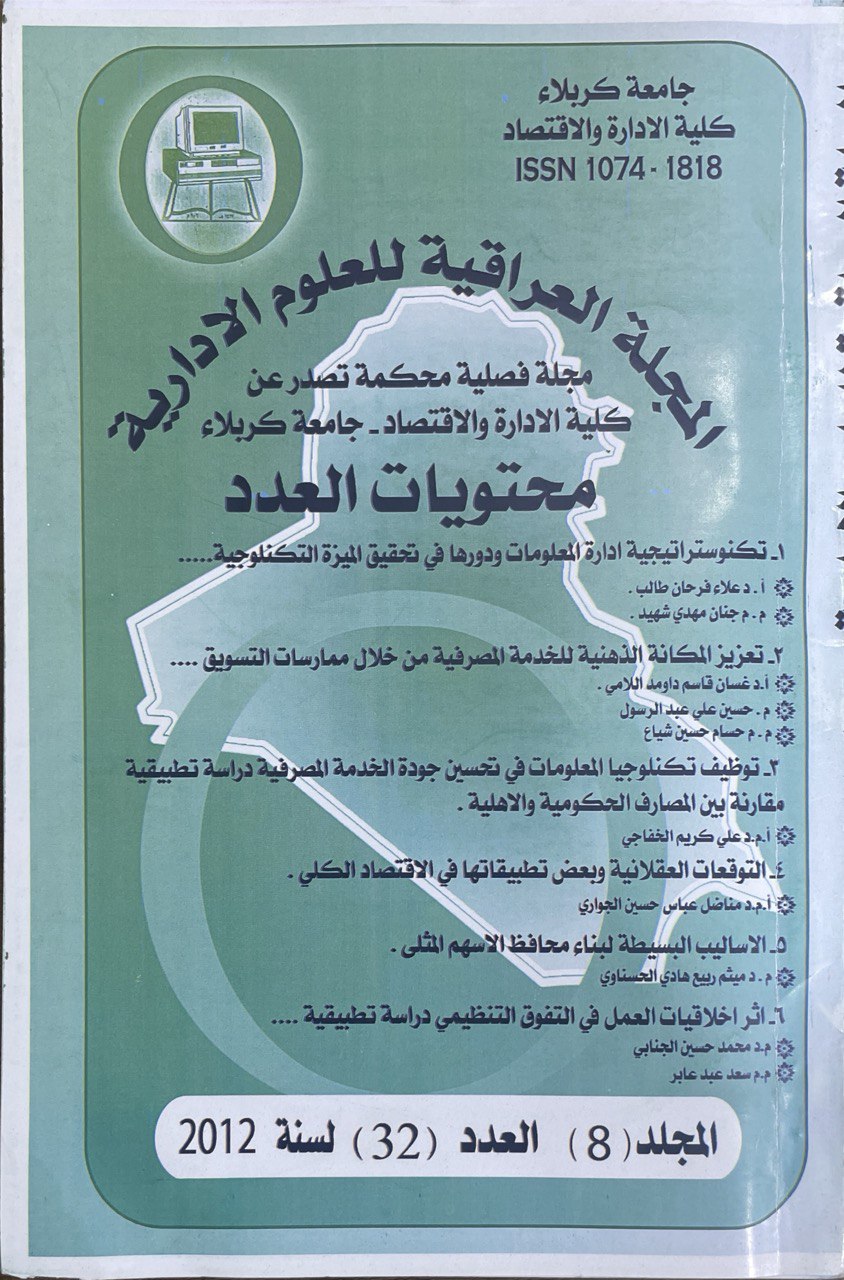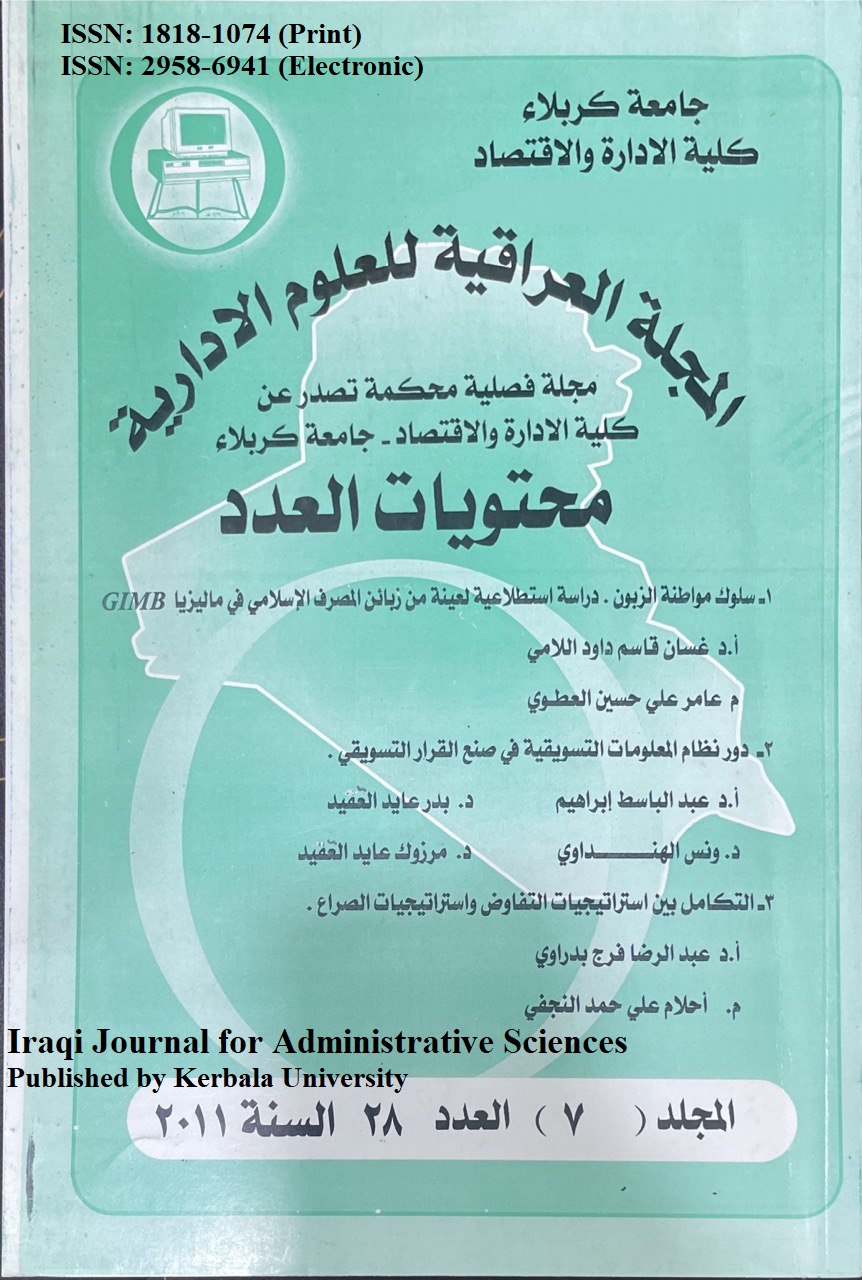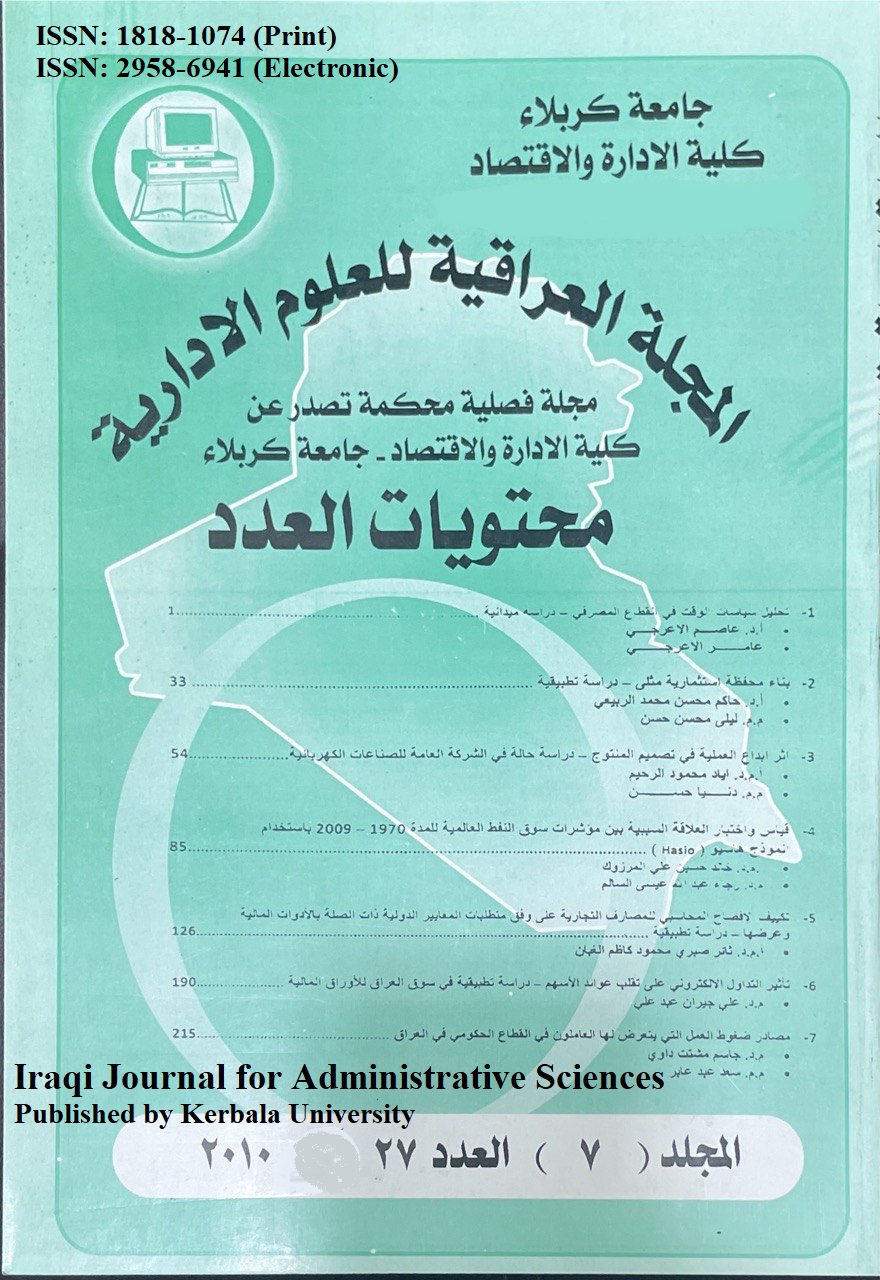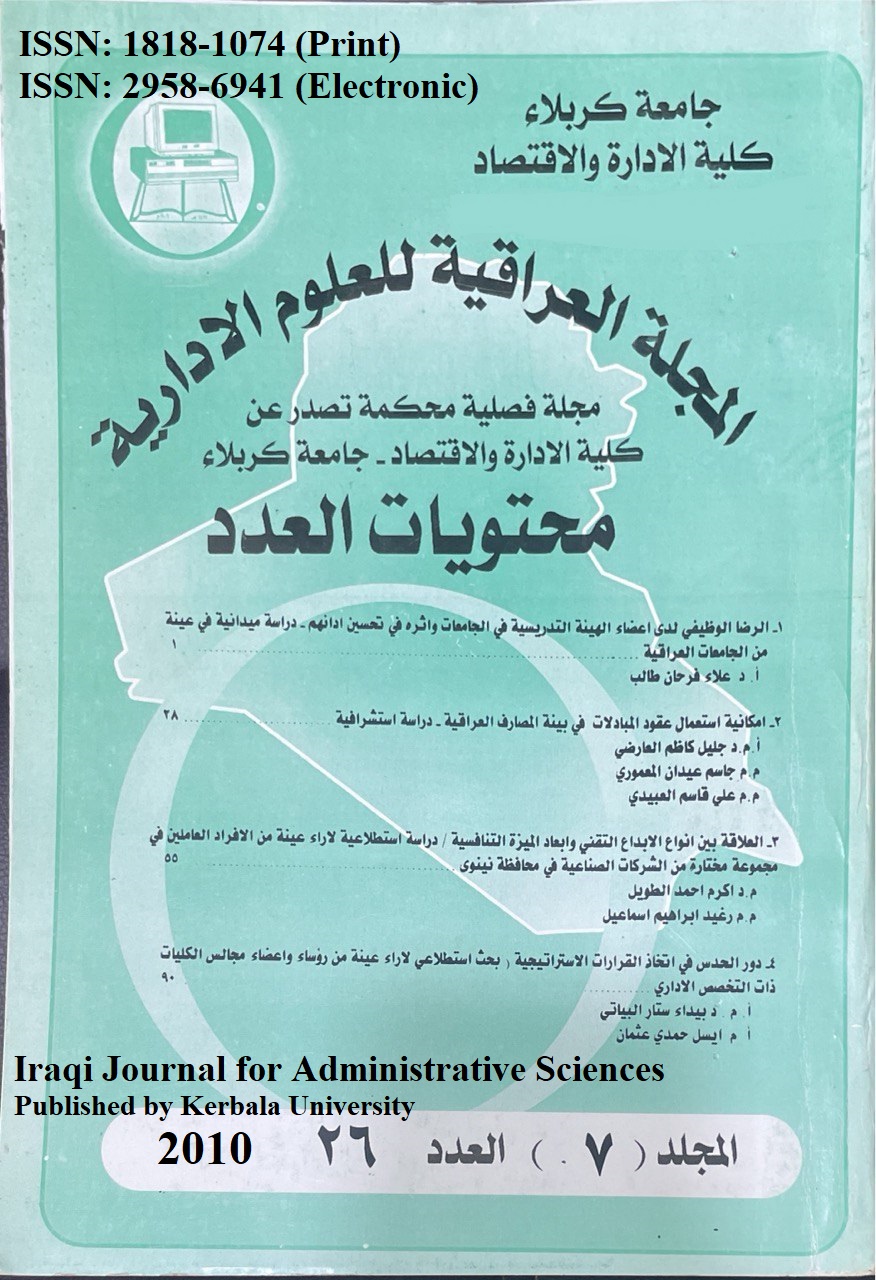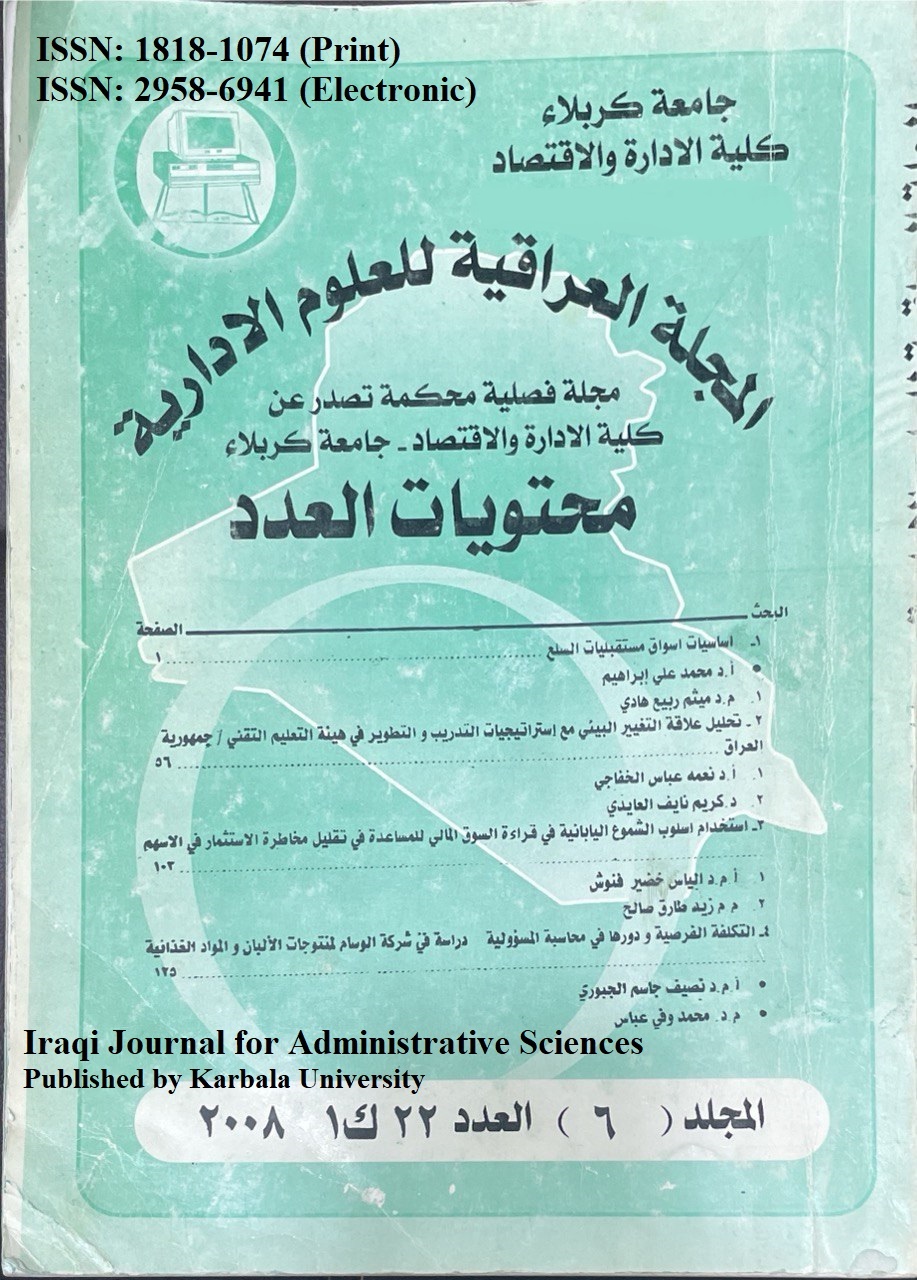Archives - Page 3
-
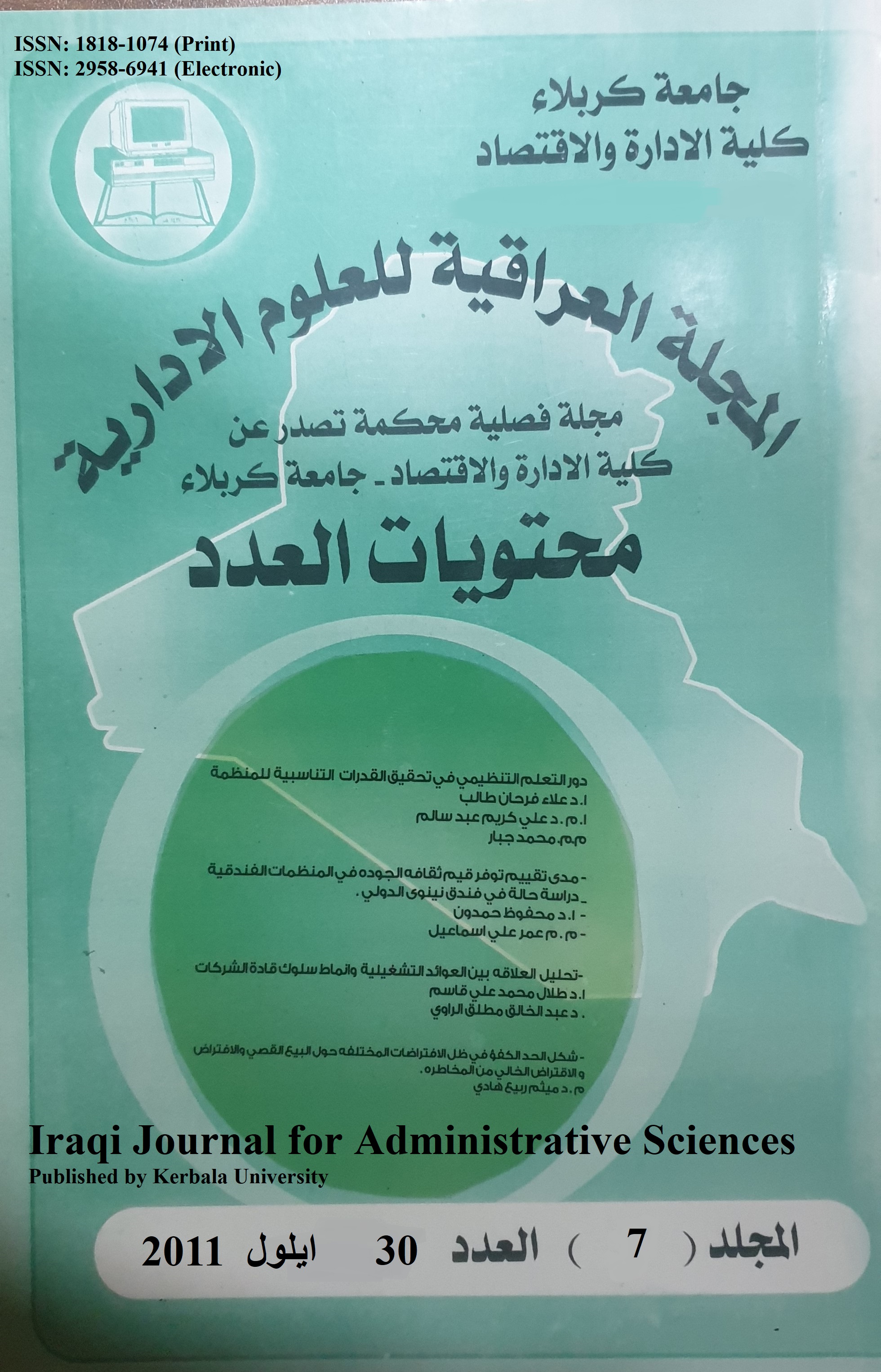
Iraqi Journal for Administrative Sciences
Vol. 7 No. 30 (2011)This issue included a variety of research in the fields of management, information technology, and organizational behavior.
-
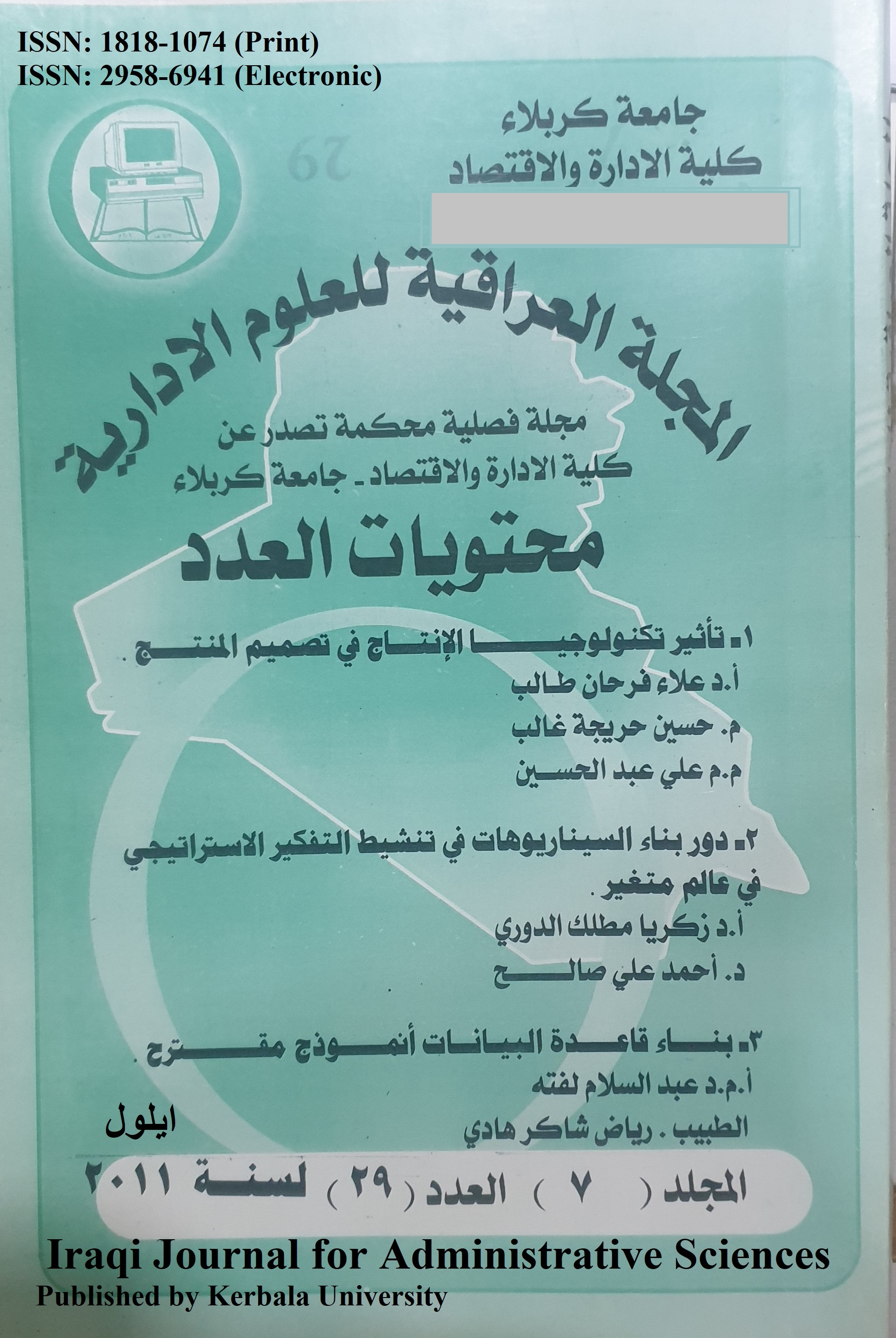
Iraqi Journal for Administrative Sciences
Vol. 7 No. 29 (2011)It included a number of articles in different areas of management
-
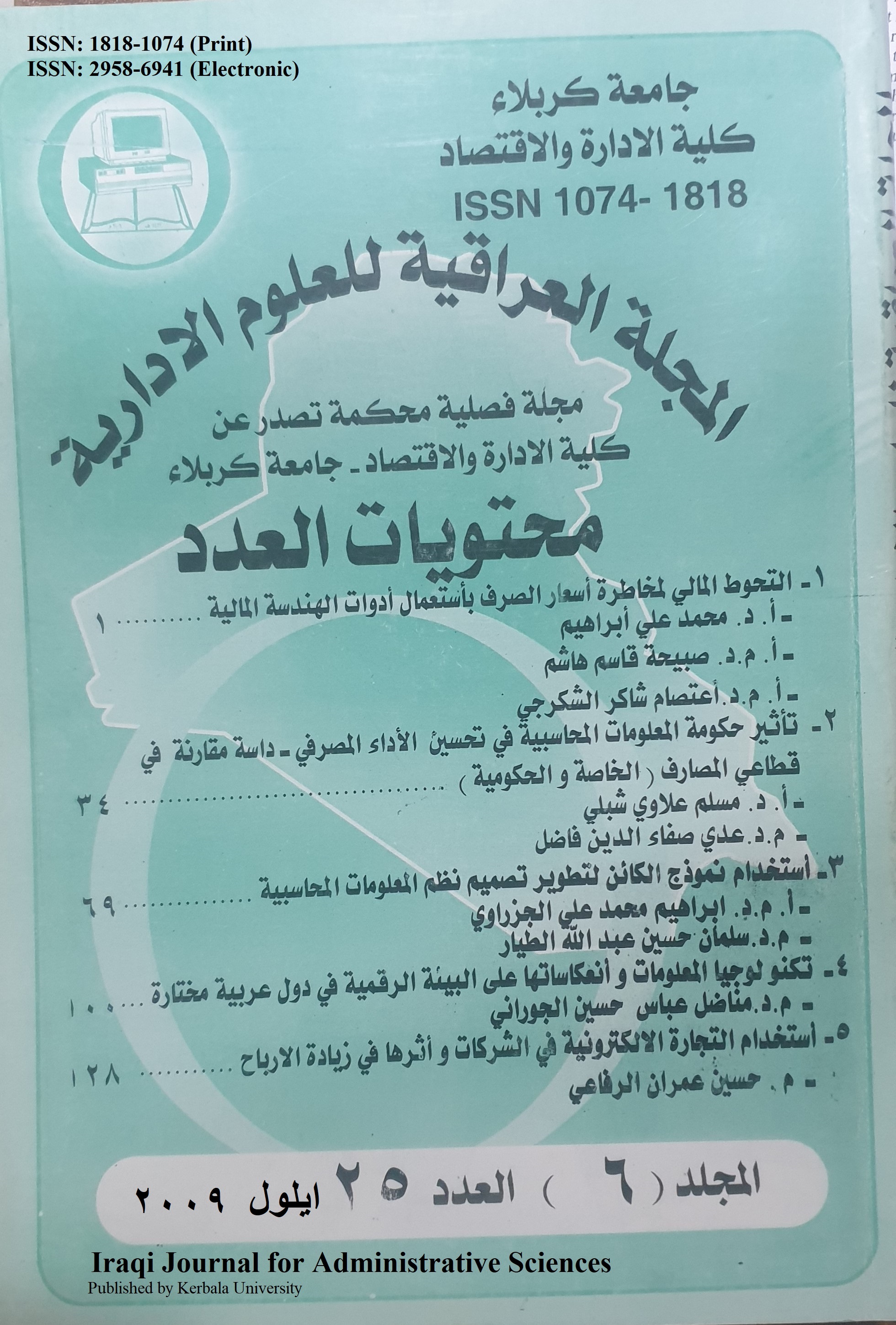
Iraqi Journal for Administrative Sciences
Vol. 6 No. 25 (2009)A number of articles were taken in the field of business administration
-
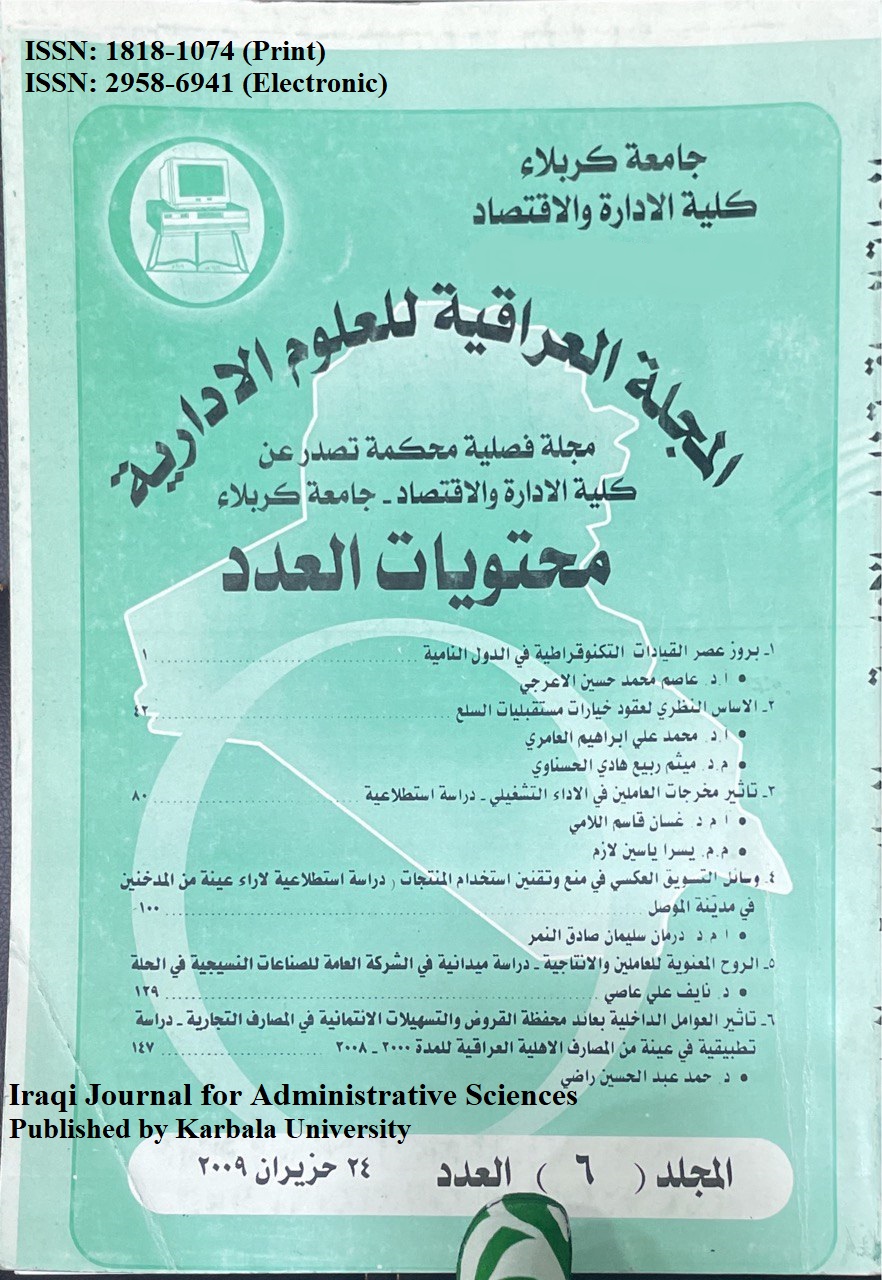
Iraqi Journal for Administrative Sciences
Vol. 6 No. 24 (2009)This collection of scholarly investigations delves into multifaceted organizational challenges across Iraq's economic landscape. Researchers meticulously examine leadership paradigms, market mechanisms, and workforce dynamics through rigorous empirical methodologies. The studies traverse critical domains including technological governance, employee productivity, strategic decision-making, and financial performance. By employing sophisticated analytical techniques, these scholarly works illuminate complex interactions between internal organizational factors and broader economic systems. The research spans diverse sectors—from industrial manufacturing to healthcare and banking—providing nuanced insights into operational efficiency, strategic planning, and economic resilience in emerging market contexts.
-
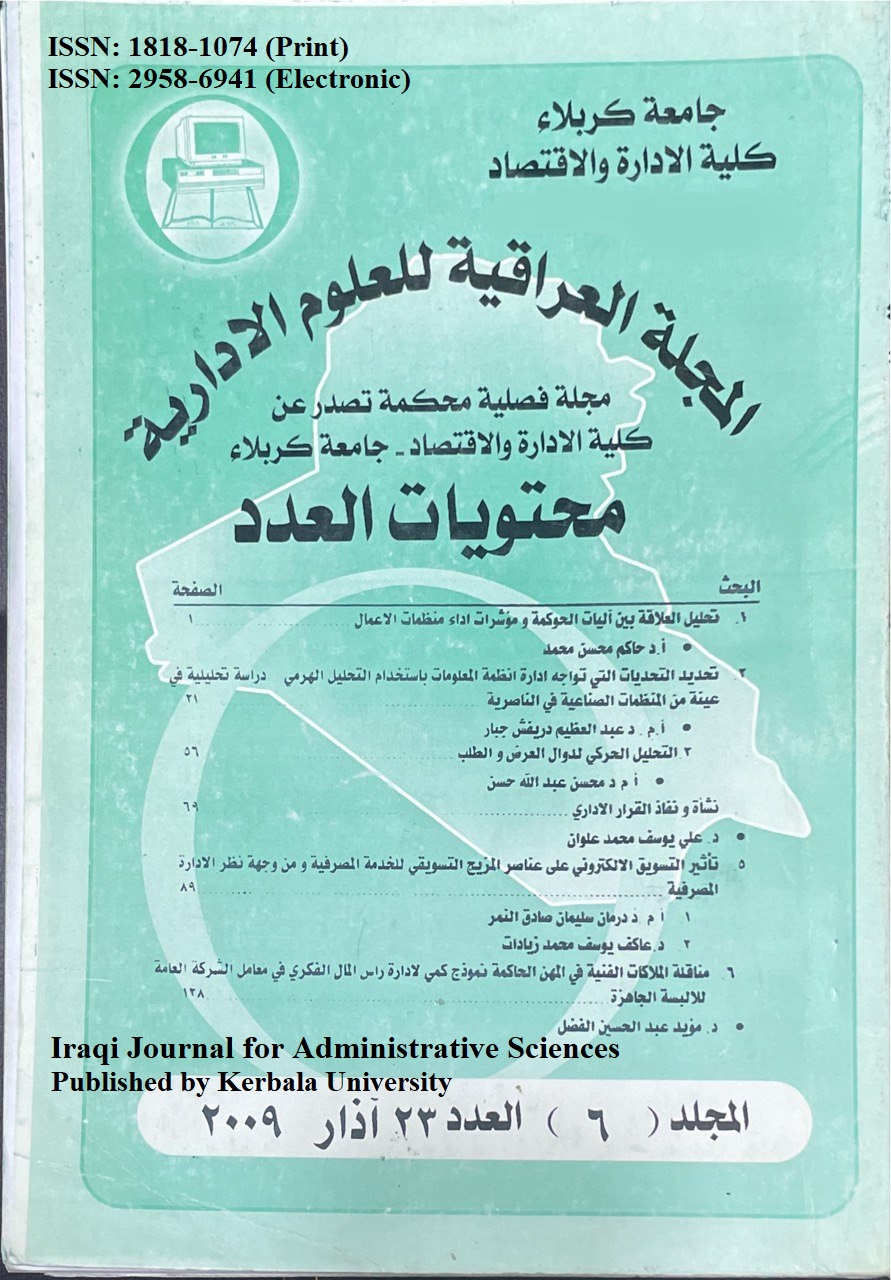
Iraqi Journal for Administrative Sciences
Vol. 6 No. 23 (2009)These research titles explore critical business and organizational challenges in Iraq through empirical and analytical approaches. The studies span diverse domains including governance, management information systems, economic dynamics, banking services, and innovation. Researchers investigate performance indicators, decision-making processes, marketing strategies, and resource management across industrial and service sectors. The research employs sophisticated methodological techniques such as quantitative modeling, analytical hierarchies, and field studies to examine complex organizational phenomena. The papers aim to provide systematic insights into improving operational effectiveness, understanding market mechanisms, and developing strategic approaches in various business contexts.
-
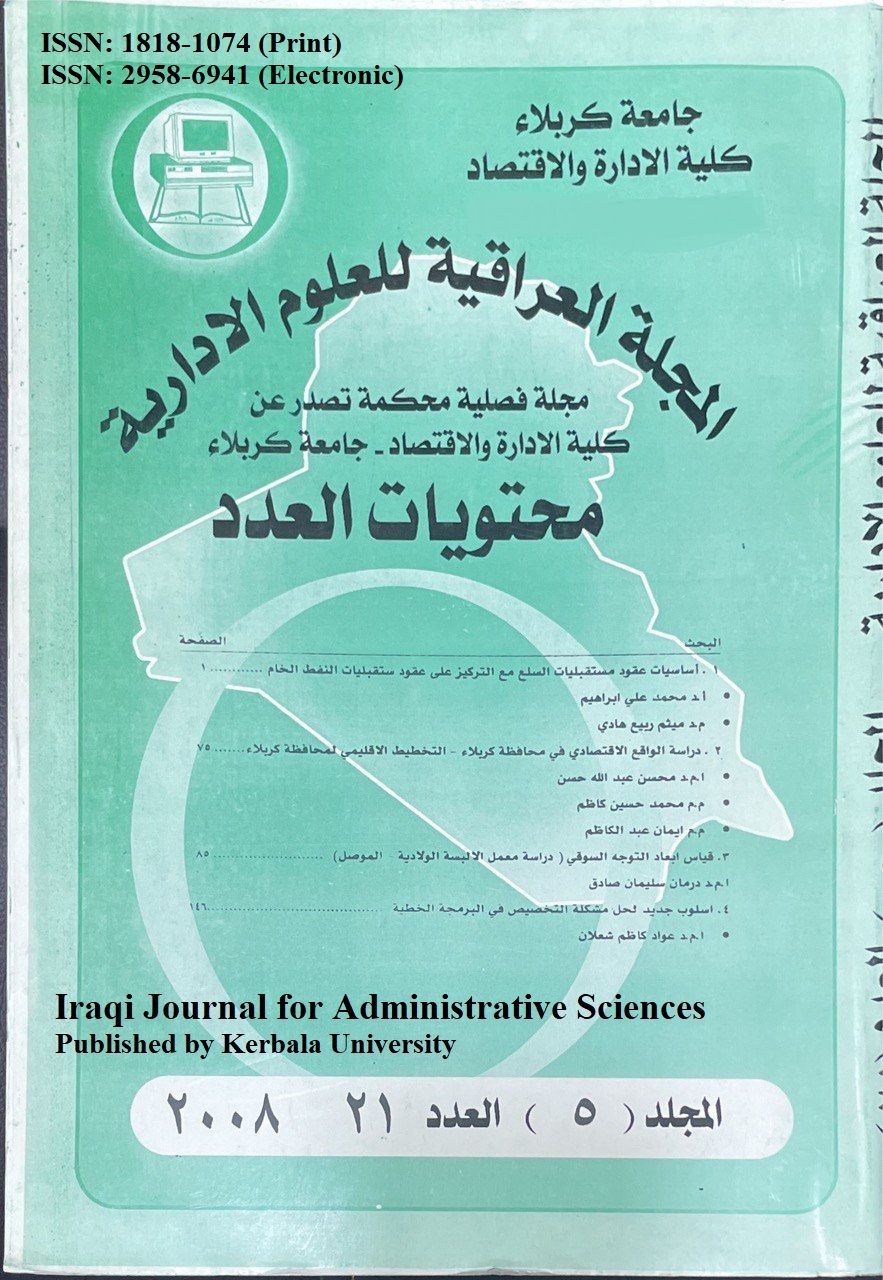
Iraqi Journal for Administrative Sciences
Vol. 5 No. 21 (2008)It includes many researches in different administrative fields
-
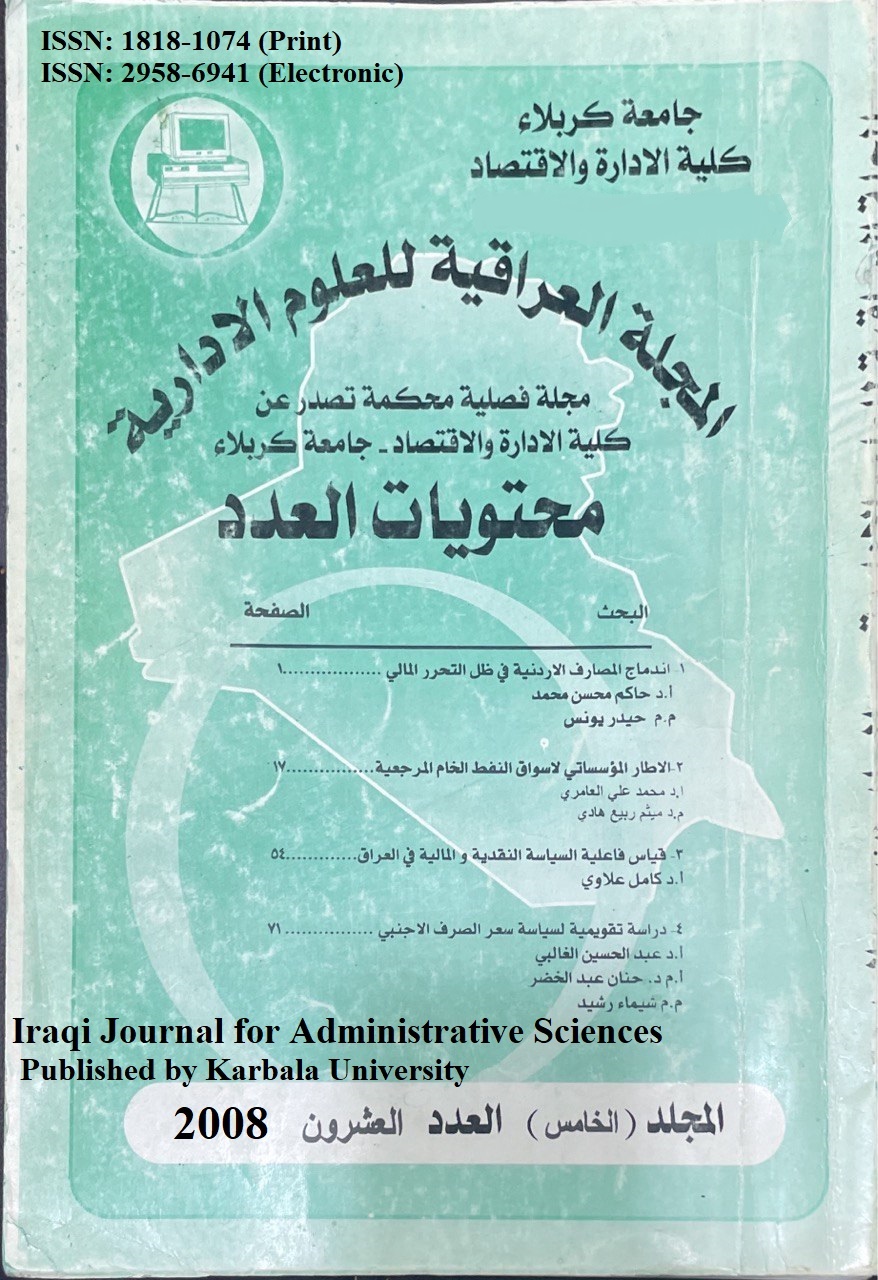
Iraqi Journal for Administrative Sciences
Vol. 5 No. 20 (2008)These titles explore various economic, financial, and organizational topics spanning multiple countries and sectors. The merger dynamics of Jordanian banks in light of financial liberalization are examined, while the institutional framework for reference crude oil markets is investigated. The measurement of effectiveness in monetary and financial policies in Iraq, as well as an evaluation study of its foreign exchange rate policy, are addressed. The interplay between organizational strategy and structure is analyzed through a field study in Jordanian organizations. Additionally, the replacement of production machine parts at the General Company for Electrical Industries - Engines Factory is explored. The phenomenon of administrative corruption worldwide is scrutinized using integrity indicators and perceptions of corruption. Finally, the relationship between individualism-collectivism orientation, ownership of work knowledge, and organizational citizenship behavior is analyzed through an analytical study, highlighting the human aspects of organizational dynamics.
-
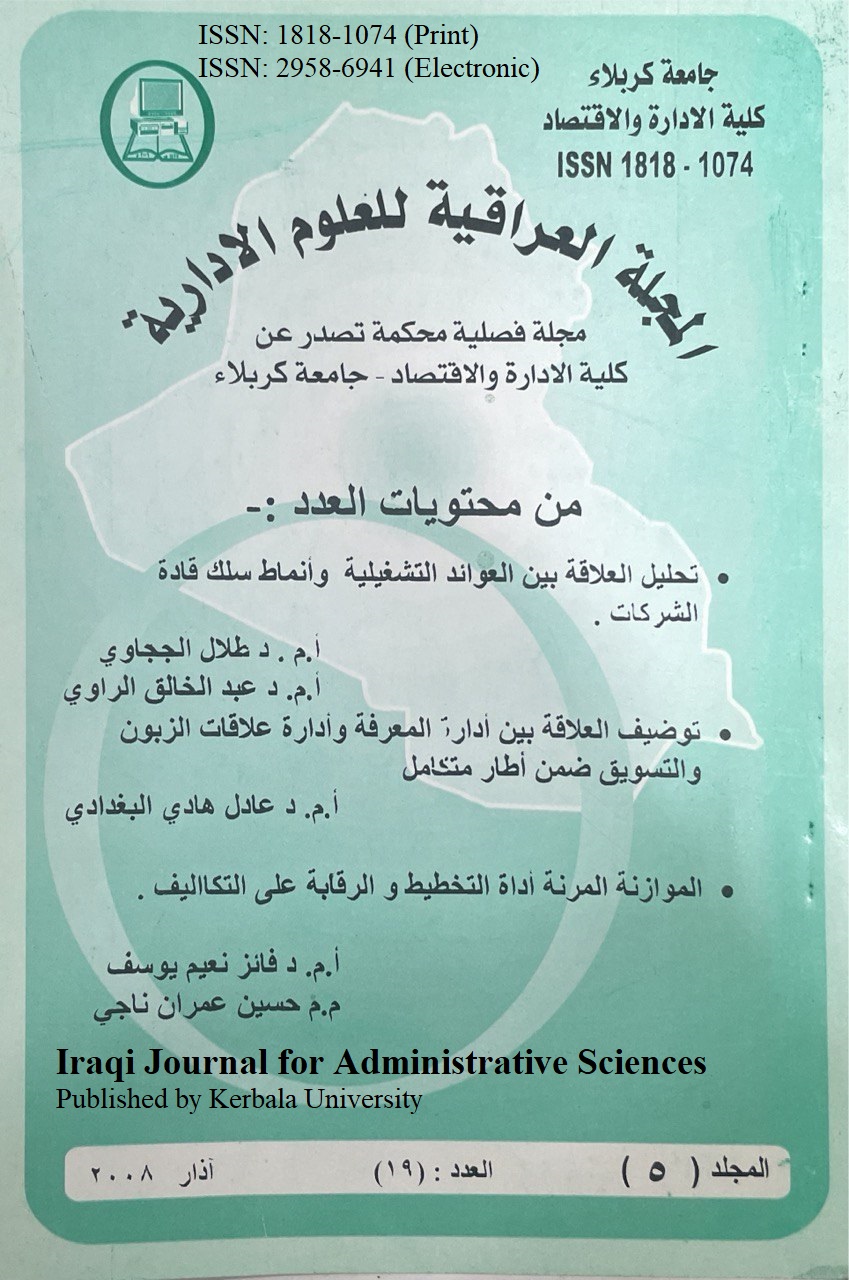
Iraqi Journal for Administrative Sciences
Vol. 5 No. 19 (2008)The given titles encompass a diverse range of topics within the business and management domain, focusing on various aspects of corporate performance, strategic planning, and operational efficiency. The studies delve into the relationship between behavioral patterns of corporate leaders and operating returns in Jordanian companies, highlighting the significance of leadership in driving financial outcomes. Additionally, the integration of knowledge management, customer relationship management, and marketing is explored within Iraqi business organizations, emphasizing the importance of a holistic approach to strategic management. The titles also address the application of flexible budgeting as a tool for planning and controlling indirect industrial costs, as exemplified by a study conducted at Al-Furat Chemical Industries Company. Furthermore, the role of library services and the potential for leveraging marketing strategies are examined, while the impact of possessed capital and deposits on banks' lending policies is investigated through a comparative study of Jordanian, Kuwaiti, and Al Rajhi Investment Banks. The production efficiency of Al-Furat Company is measured over an eight-year period, and the application of quality engineering techniques to audit and improve production processes is showcased through a study at the General Company for Textile Industries in Hilla.
-
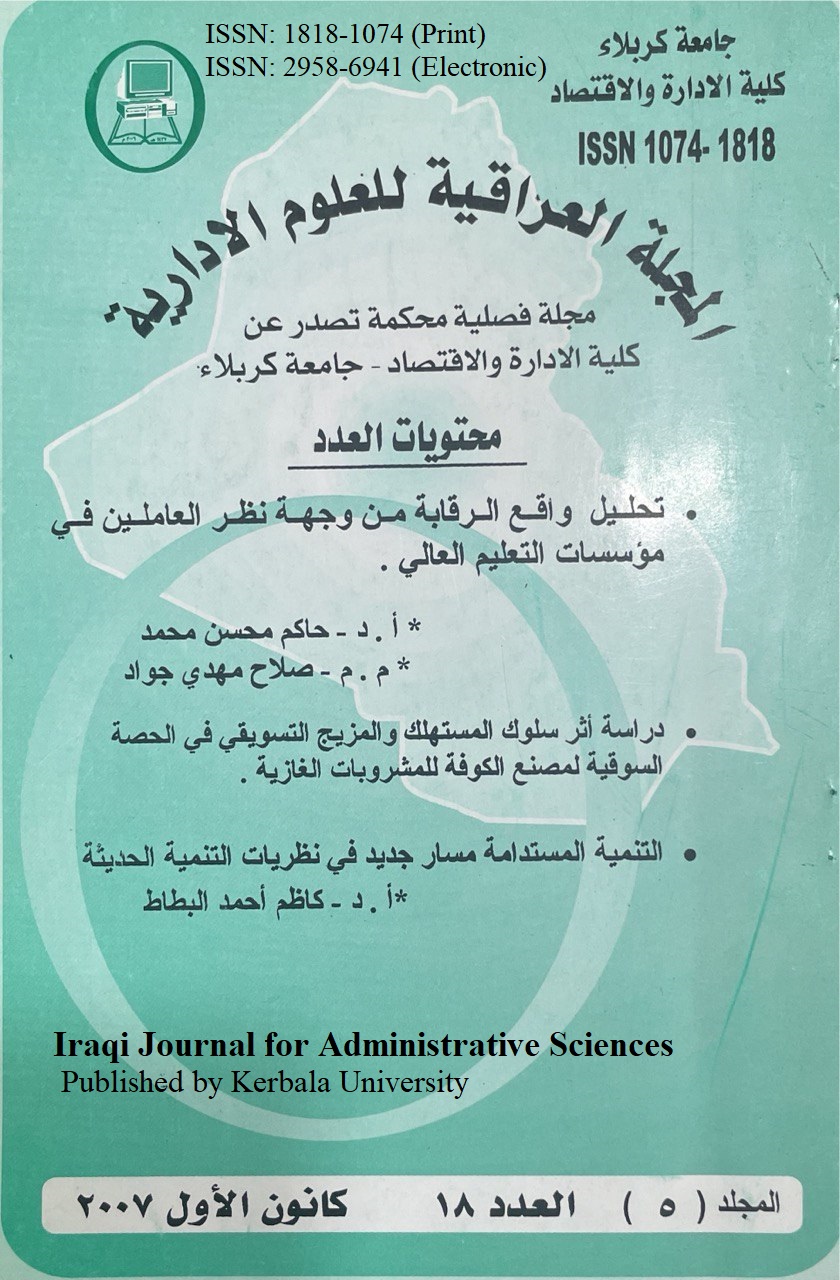
Iraqi Journal for Administrative Sciences
Vol. 5 No. 18 (2007)These topics span economic development, education, finance, consumer behavior, and statistical modeling areas. The first analyzes employee perspectives on financial control processes at higher education institutions, exploring how well budgeting and oversight functions are carried out. The second examines factors driving consumer purchasing decisions and how marketing mix elements like product, price, promotion and place impact market share for a beverage company. The third and fourth titles relate to sustainable development and modernizing higher education models. One looks at sustainable development as an emerging paradigm reformulating traditional economic growth theories. The other proposes developing university programs around distance learning, e-learning, open education and virtual classrooms as part of enhancing human capital. The fifth topic covers Islamic economic planning principles aiming to balance individual self-interest with societal benefit. Faith-based guidelines influence areas like property rights, wealth distribution and social welfare priorities. The final item is a quantitative study comparing the accuracy of the Boys estimation method versus ordinary least squares regression for modeling the relationship between money supply and GDP in Iraq. These diverse titles illustrate research investigating economic and educational development issues from multiple perspectives - institutional processes, consumer behavior, sustainability frameworks, technology applications, Islamic principles and econometric techniques. Understanding these facets is critical for comprehensive policymaking.
-
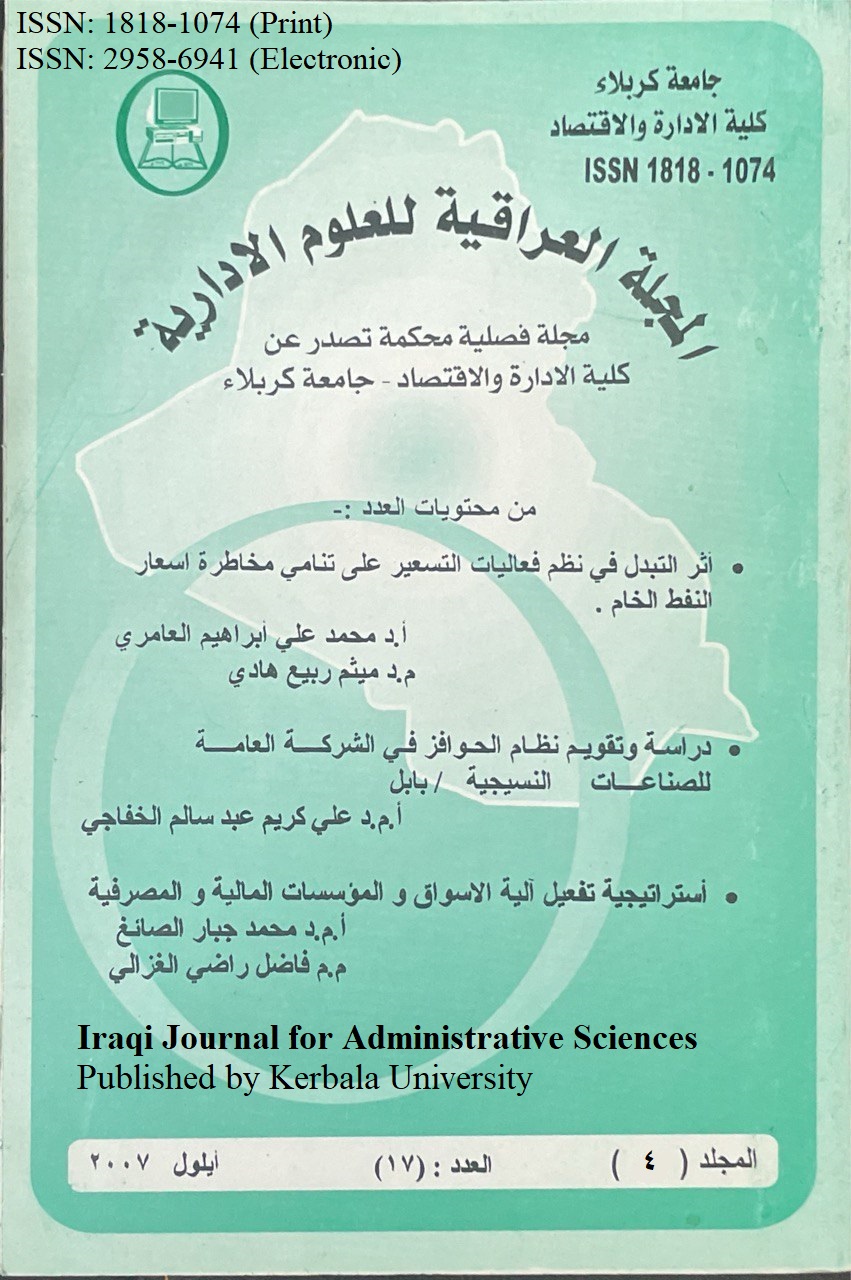
Iraqi Journal for Administrative Sciences
Vol. 4 No. 17 (2007)These diverse research topics span several key areas of business and operations management. The first looks at how fluctuations in crude oil pricing impact broader economic risk factors. As oil is a globally traded commodity, price volatility can have wide-ranging ripple effects. The second examines incentive systems at a textile company, evaluating how compensation structures motivate employee performance. Effective incentive design is crucial for boosting productivity and retention. The third topic explores how financial markets and institutions need to adapt their strategies in today's globalized economy. It likely analyzes impacts of trends like rising international trade, global supply chains, and integrated capital markets. The fourth focuses on using total quality management (TQM) principles to improve customer relationship management, with a case study on a beverage manufacturer. TQM emphasizes processes to enhance quality and customer satisfaction. The fifth research area is controlling and monitoring manufacturing costs through systematic cost management. Identifying and mitigating cost drivers is essential for profitability. The final topic covers reliability-centered maintenance (RCM) to increase production equipment availability at an apparel factory. RCM aims to perform maintenance when needed to reduce downtime and extend asset lifespans. Collectively, these titles illustrate the diversity of challenges facing modern businesses. Effective strategies around areas like pricing, incentives, financial adaptation, quality, cost control, and maintenance can spell the difference between success and failure.
-
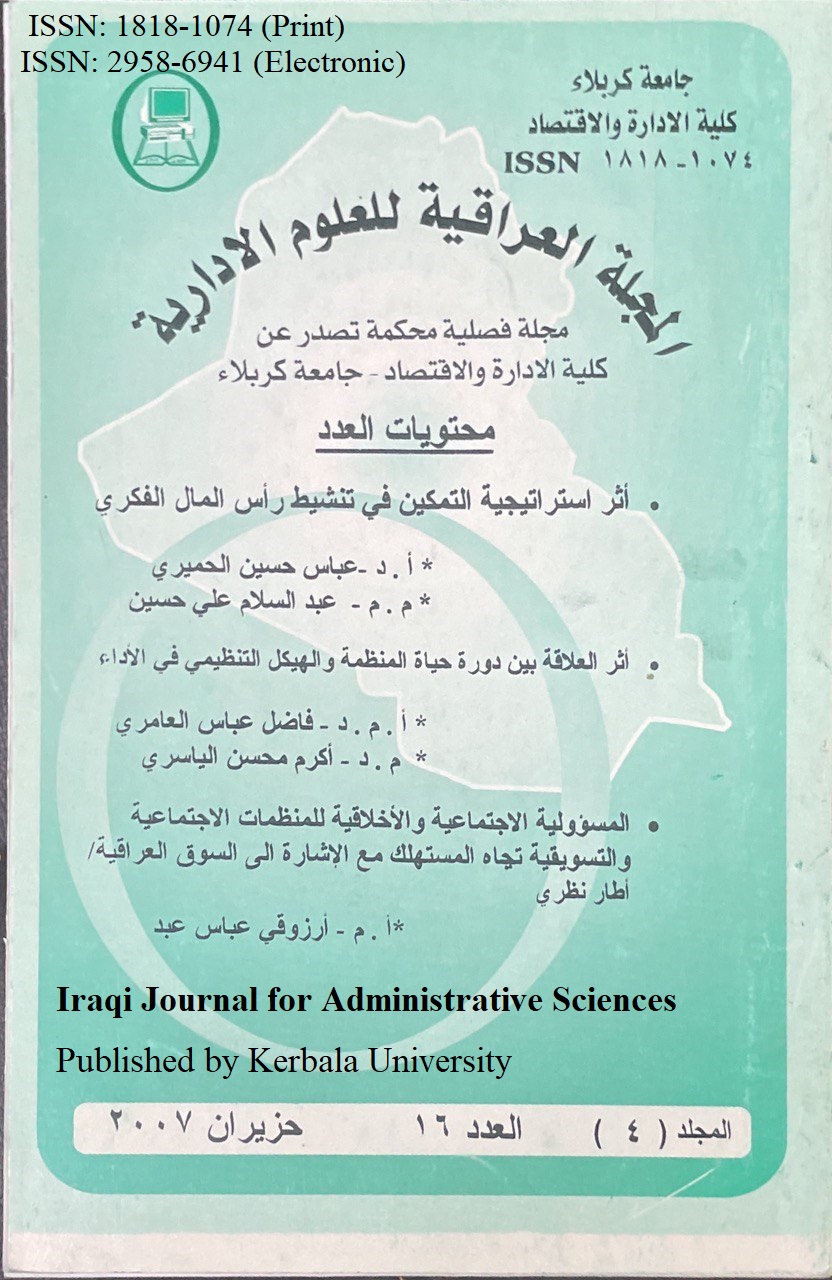
Iraqi Journal for Administrative Sciences
Vol. 4 No. 16 (2007)This issue includes research in the field of strategic management and human resources
-
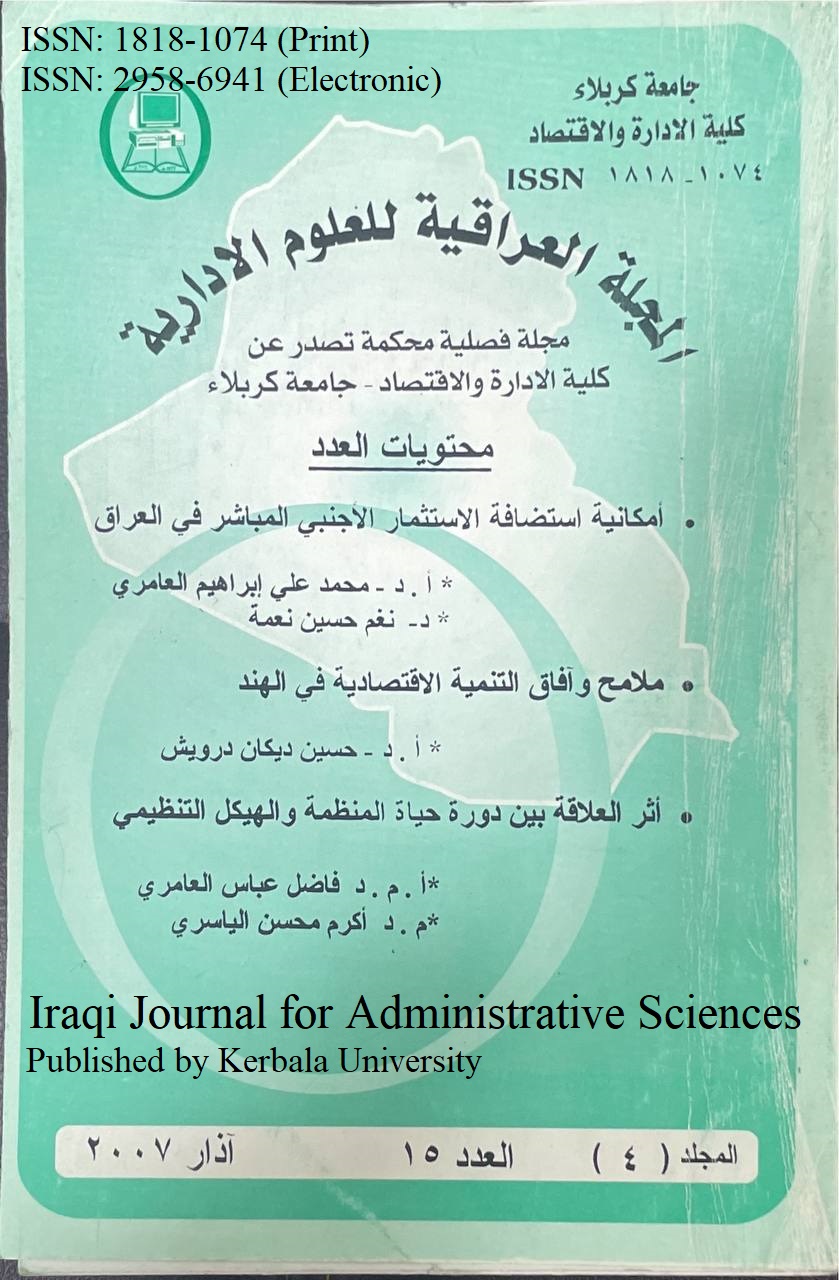
Iraqi Journal for Administrative Sciences
Vol. 4 No. 15 (2007)It includes a number of articles on management
-

Iraqi Journal for Administrative Sciences
Vol. 4 No. 14 (2006)It included a number of articles in the field of business administration and leadership
-
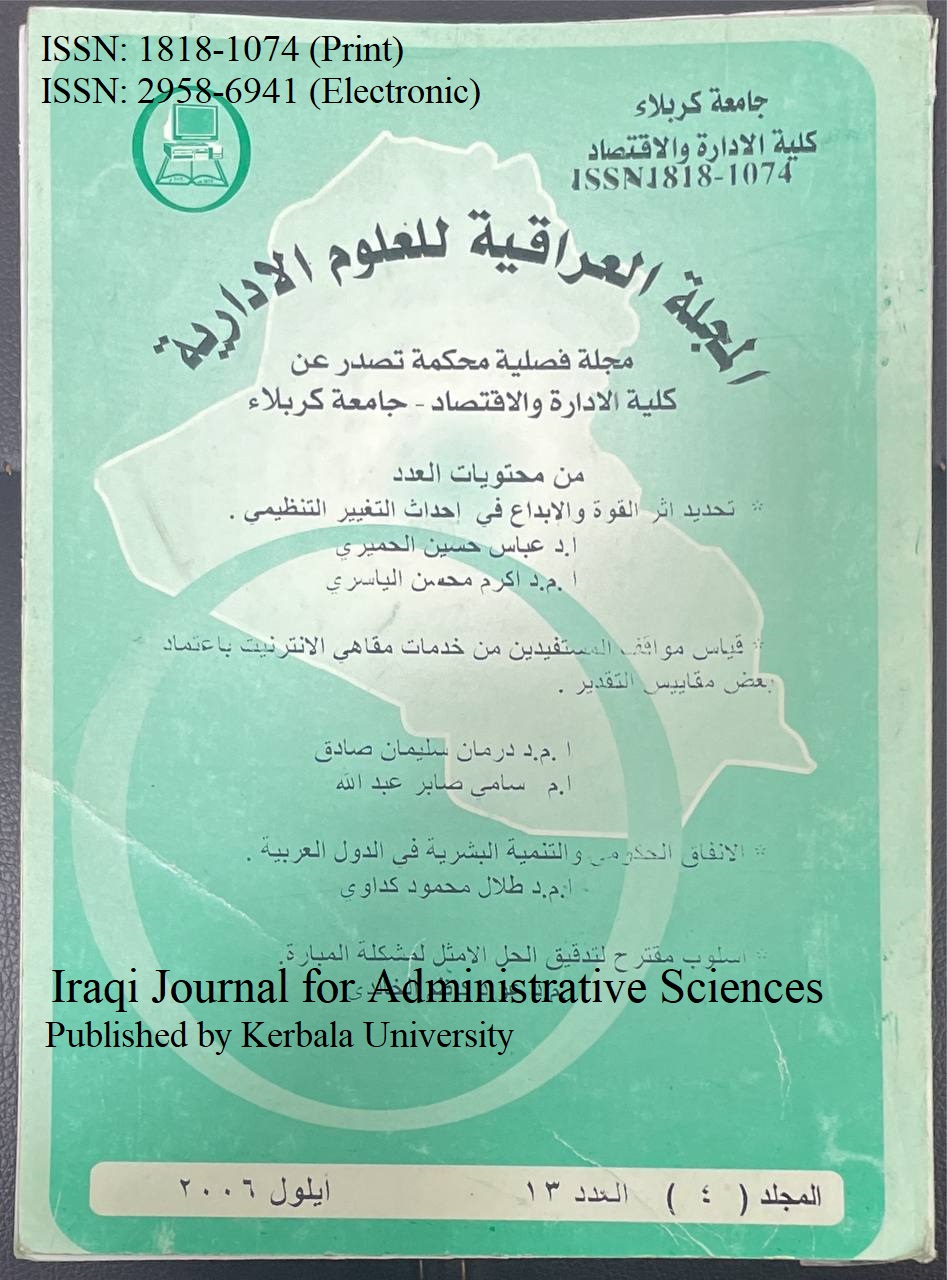
Iraqi Journal for Administrative Sciences
Vol. 4 No. 13 (2006)It includes a number of articles in the field of business administration
-
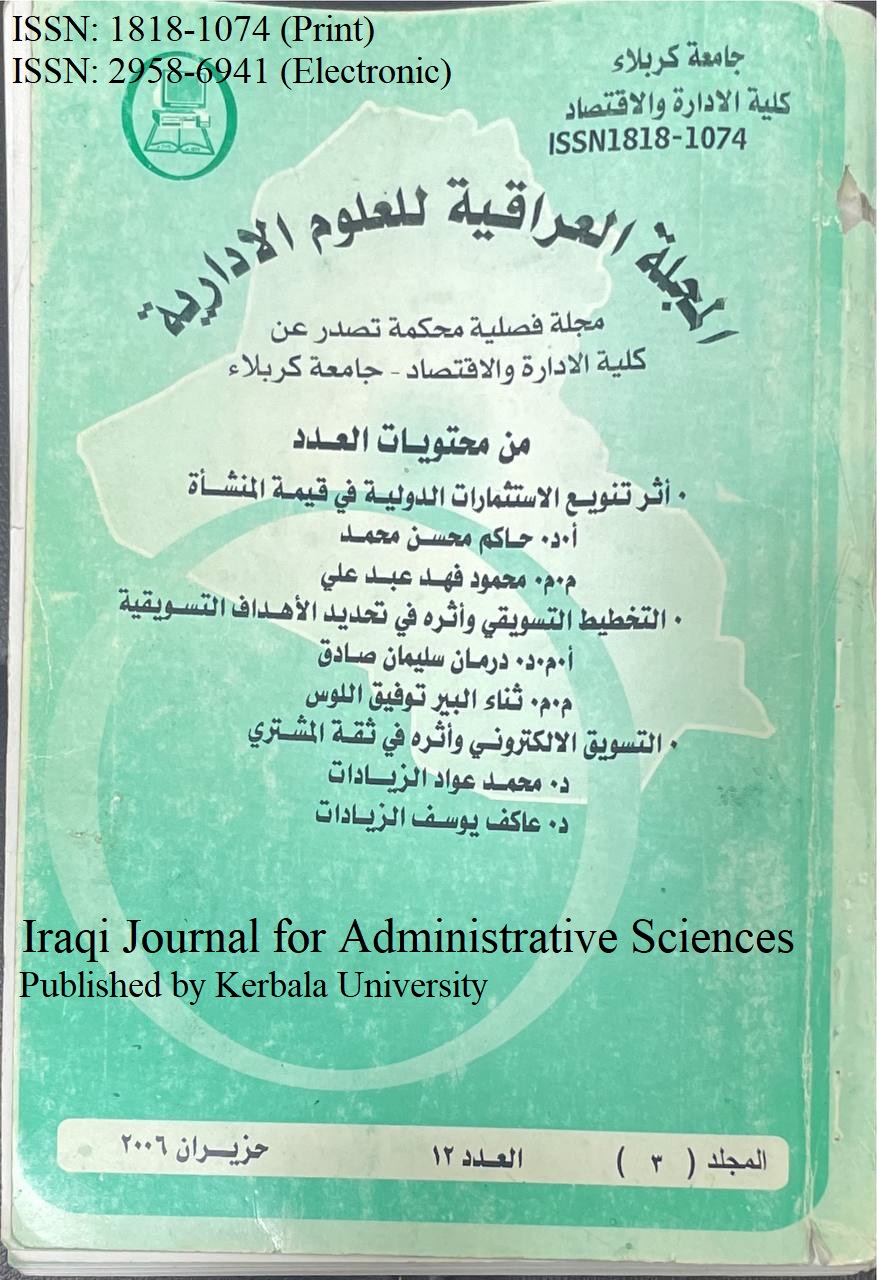
Iraqi Journal for Administrative Sciences
Vol. 3 No. 12 (2006)A number of management areas were mentioned in this issue
-
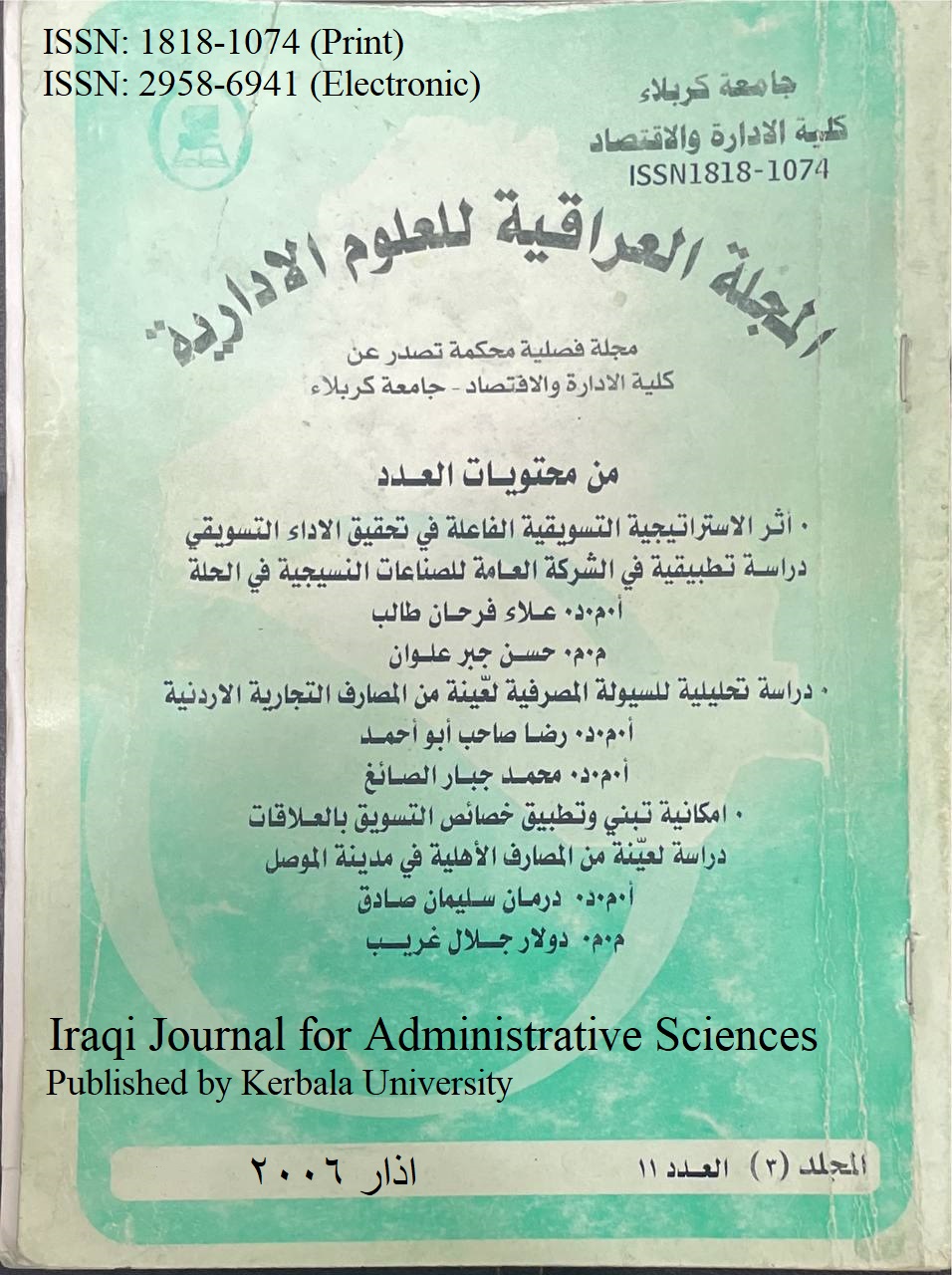
Iraqi Journal for Administrative Sciences
Vol. 3 No. 11 (2006)It includes a number of articles in the fields of management and strategy
-
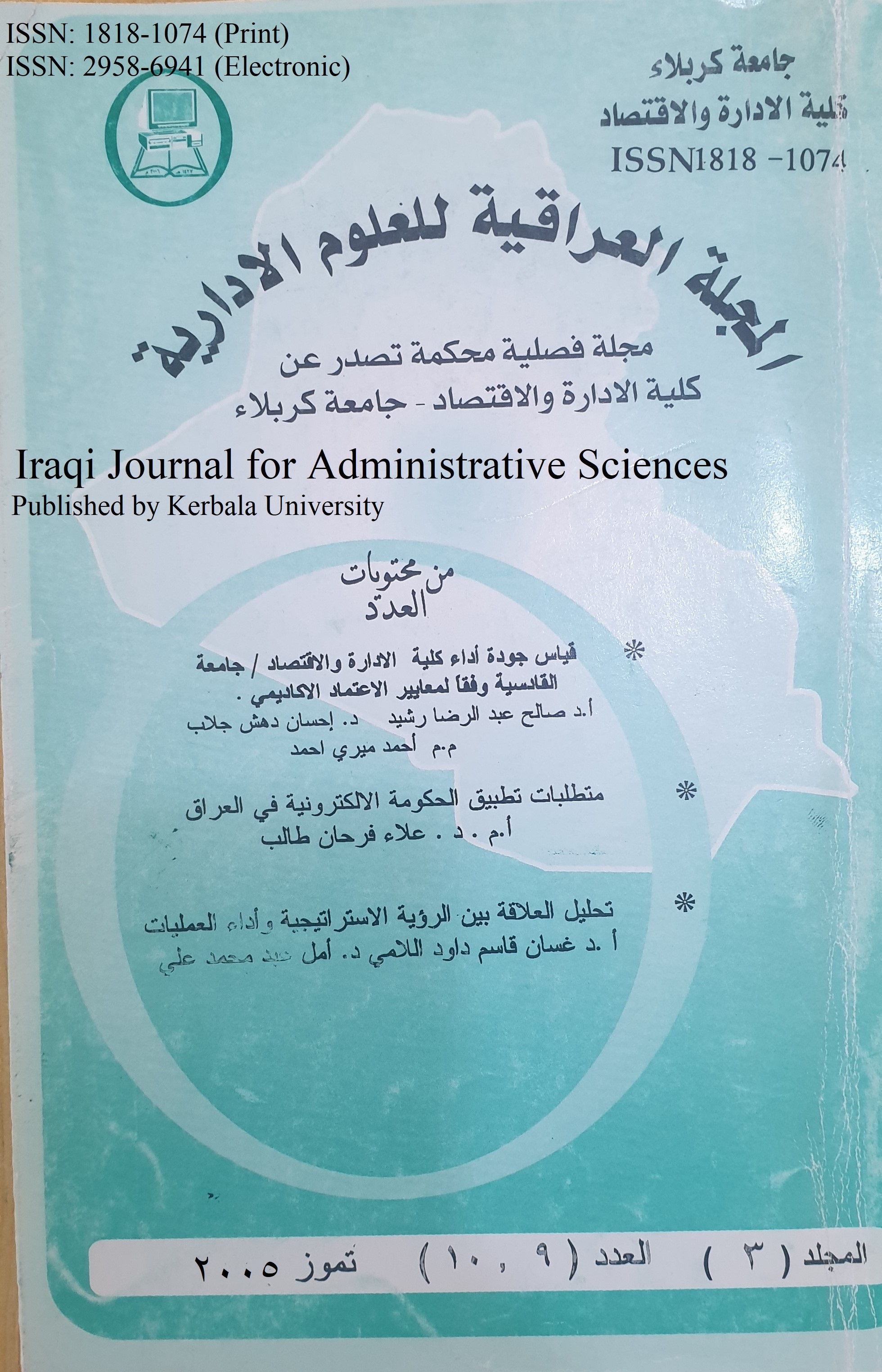
Iraqi Journal for Administrative Sciences
Vol. 3 No. 9-10 (2005)The two issues were taken into one issue and includes a number of research in the field of business administration
-
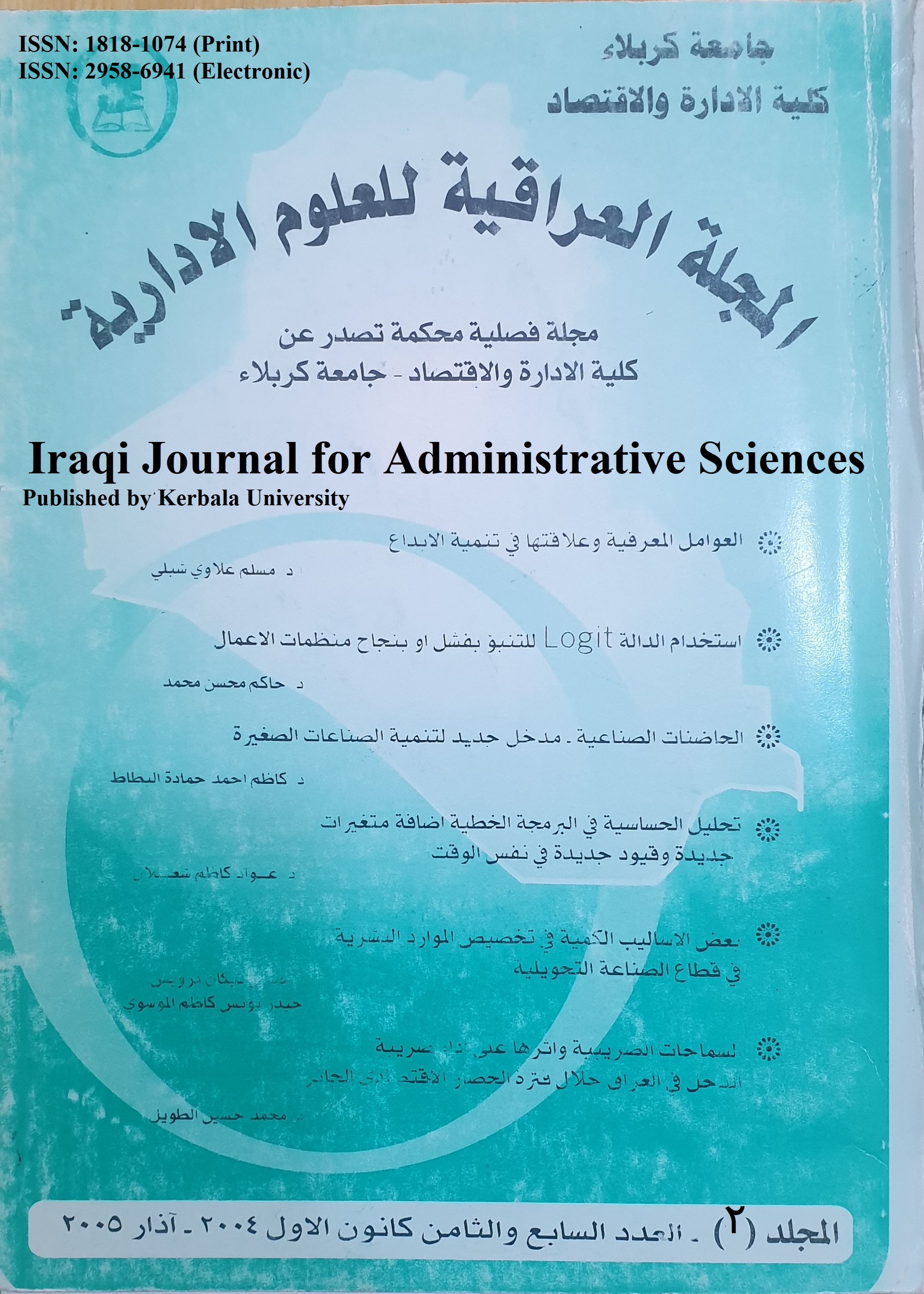
Iraqi Journal for Administrative Sciences
Vol. 2 No. 8-7 (2005)The seventh and eighth issues were published in one issue and contained a number of articles in the field of business administration
-

Iraqi Journal for Administrative Sciences
Vol. 2 No. 6 (2004)The articles in this issue varied in several areas of business administration

